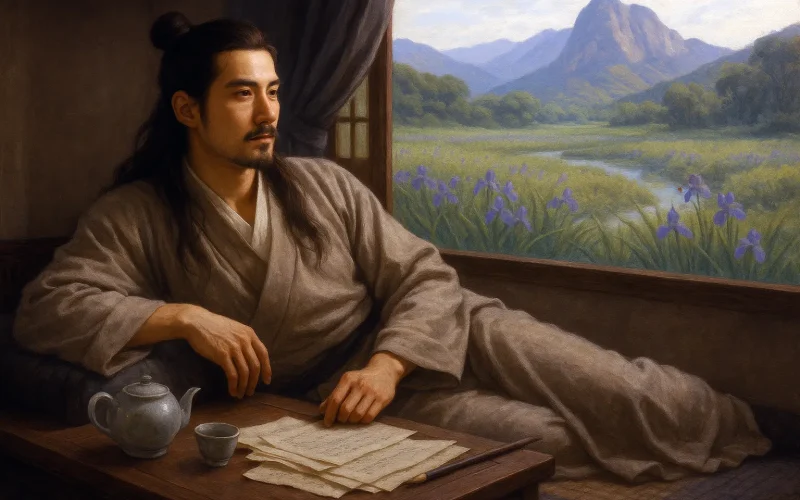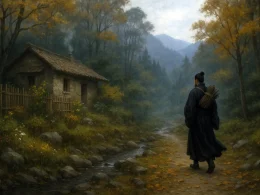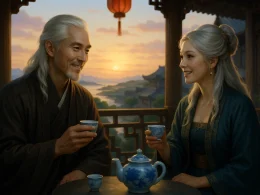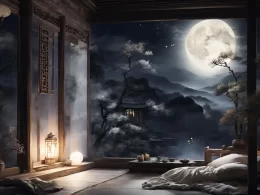Though we missed our spring city drinking date,
I've written texts but poems must wait.
Chanting Chu's shore with orchids in full bloom,
I'd gather triple-gems from Shang's cliff gloom.
Wild cranes need wider cages to be free,
Mountain monks' meals need special cookery.
Just cure Shen Yue's dim eyes to make them clear,
Then river flowers will branch without fear.
Original Poem
「奉和袭美抱疾杜门见寄次韵」
陆龟蒙
虽失春城醉上期,下帷裁遍未裁诗。
因吟郢岸百亩蕙,欲采商崖三秀芝。
栖野鹤笼宽使织,施山僧饭别教炊。
但医沈约重瞳健,不怕江花不满枝。
Interpretation
This poem was written by Lu Guimeng in response to his friend Pi Rixiu (courtesy name Pimei). Confined at home due to illness, Pi was unable to join Lu for a spring literary gathering and instead sent a poem expressing his regrets. Lu and Pi shared a deep friendship, often exchanging poems, and were known together as "Pi-Lu." Under the guise of a poetic reply, this work conveys both concern and encouragement for the ailing friend, reflecting their shared ideals and profound bond amid adversity. It expresses regret over missing spring’s joys but also embodies a recluse’s resilience and broad-mindedness.
First Couplet: "虽失春城醉上期,下帷裁遍未裁诗。"
Suī shī chūn chéng zuì shàng qī, xià wéi cái biàn wèi cái shī.
Though we missed our date to drink deeply in the spring city,
You’ve lowered the curtain, revising old poems, yet composing no new ones.
The opening acknowledges the friend’s confinement due to illness. There is regret but also consolation. "Missed" (失 shī) conveys the loss of springtime drinking joy; "composing no new ones" (未裁诗 wèi cái shī) implies the unmet hope for poetic exchange between friends.
Second Couplet: "因吟郢岸百亩蕙,欲采商崖三秀芝。"
Yīn yín Yǐng àn bǎi mǔ huì, yù cǎi shāng yá sān xiù zhī.
Chanting, you roam Ying’s banks with acres of orchids;
Longing to gather triple-bloom moss on Shang’s cliffs.
Fragrant herbs and divine mushrooms metaphorize poetic talent and virtue. This praises Pi’s literary gifts and suggests that though confined by illness, his spirit still yearns for lofty poetic realms and beauty.
Third Couplet: "栖野鹤笼宽使织,施山僧饭别教炊。"
Qī yě hè lóng kuān shǐ zhī, shī shān sēng fàn bié jiào chuī.
The wild crane perches in a wide-woven cage;
The mountain monk’s meal is cooked in its own way.
The crane and monk images symbolize self-comfort and consolation. The former evokes leisurely self-contentment; the latter, finding joy in simple poverty. The message: even confined and living simply, one need not worry but can find contentment.
Fourth Couplet: "但医沈约重瞳健,不怕江花不满枝。"
Dàn yī Shěn Yuē chóng tóng jiàn, bù pà jiāng huā bù mǎn zhī.
Just heal as Shen Yue did—your eyes clear and bright—
Then fear not the river flowers failing to brim the branches.
The poet alludes to Shen Yue of the Southern Dynasties, who recovered from eye illness, to wish his friend well. The final line uses river flowers as a metaphor: if health returns, even missed spring blooms can be enjoyed again, expressing heartfelt care.
Holistic Appreciation
The poem is warm, natural, and deeply affectionate. It opens with the "missed date," expressing regret over the lost spring gathering, then unfolds with imagery of herbs, cranes, and monks to comfort the friend in quiet cultivation and recovery. The closing couplet offers health wishes through allusion, concluding with subtle restraint.
Without direct sorrow, the poem resolves the sadness of illness with a broad-minded tone. It conveys not only friendship but also the poet’s own state of mind—in the turbulent late Tang, both Lu and Pi stayed away from officialdom, embracing nature as commoners. Through this poetic exchange, Lu consoles his friend and also expresses his own feelings.
Artistic Merits
- Poetic response centered on friendship: Originating as a reply to a friend’s verse, the poem’s purpose is to respond to Pi’s work. Sincere affection shines throughout, with comfort and good wishes at its core, brimming with camaraderie.
- Natural allusions, creating an elevated and refined atmosphere: Many allusions—"Ying’s orchids," "Shang’s moss," "Shen Yue’s eyes"—draw on classics yet blend seamlessly into the poetic scene, elevating the tone and enriching the imagery.
- Vivid figurative expressions, emotion through objects: The crane and monk are highly symbolic—the crane implies leisure and nobility, the monk signifies calmness in poverty. Through imagery, the poet conveys understanding and comfort for his friend’s situation.
- Subtle language, leisurely style: Avoiding intense grief, the poem blends illness, friendship, and spring scenery with a light, peaceful tone, reflecting Lu’s characteristic relaxed style.
- Persuasion through scenery, comfort through metaphor: From the lost spring outing to the pure herbs and moss, then to the leisurely crane and monk, the poem progresses layer by layer, culminating in hopes for health—forming a complete logic of consolation.
Insights
This poem teaches that true friendship lies not only in shared joy but also in caring during adversity. Lu Guimeng uses verse to convey solace, transforming spring’s pleasure into spiritual comfort, expressing the wisdom that "illness need not hinder ambition, nor poverty change sentiment." It inspires us to offer sincere encouragement and gentle care—providing spiritual support and strength—when friends face sickness or hardship.
About the poet
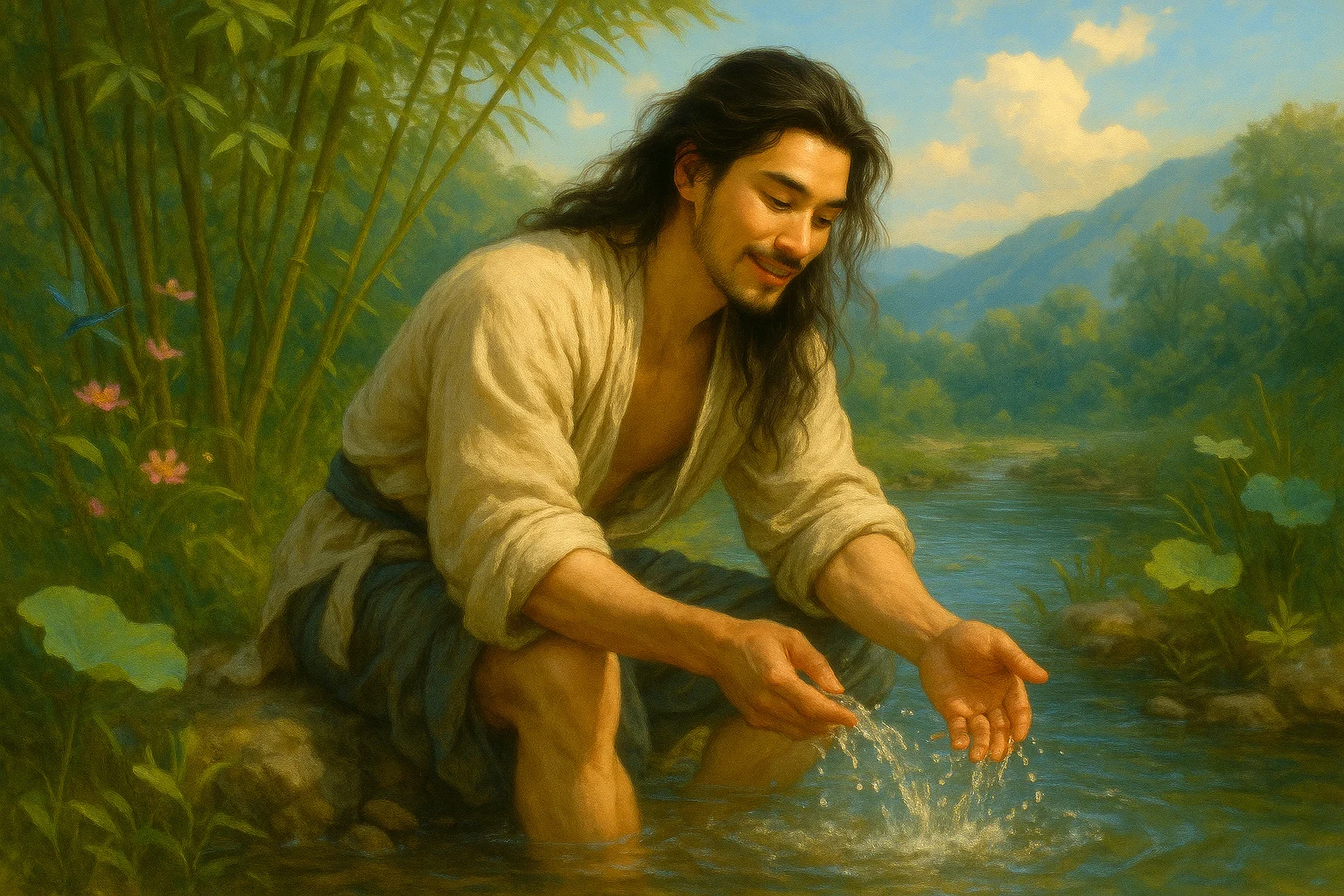
Lu Guimeng (陆龟蒙 ?– c. 881 CE), a native of Suzhou, Jiangsu, was a Late Tang dynasty writer and agronomist. After failing the imperial examinations, he retreated to a reclusive life in Puli, Songjiang. He formed a famous literary partnership with the poet Pi Rixiu, and the pair are often referred to collectively as "Pi-Lu." His poetry is known for its social satire and a style that is incisive yet subtly restrained. His inclusion in the Biographies of Talents of the Tangunderscores his significance. The modern writer Lu Xun famously praised his essays, noting that they provided "a sharp radiance piercing through a world of muddle". Lu Guimeng is regarded as a uniquely distinctive voice in the literary scene of the late Tang.






